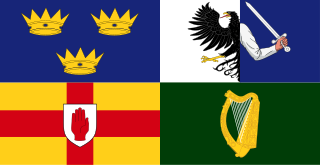
John Ogilby was a Scottish translator, impresario, publisher and cartographer. He was probably at least a half-brother to James Ogilvy, 1st Earl of Airlie, though neither overtly acknowledged this. Ogilby's most-noted works include translations of the works of Virgil and Homer, and his version of the Fables of Aesop.

James Shirley was an English dramatist.

The history of Irish theatre begins in the Middle Ages and was for a long time confined to the courts of the Gaelic and "Old English" – descendants of 12th-century Norman invaders – inhabitants of Ireland. The first theatre building in Ireland was the Werburgh Street Theatre, founded in 1637, followed by the Smock Alley Theatre in 1662.

Thomas Killigrew was an English dramatist and theatre manager. He was a witty, dissolute figure at the court of King Charles II of England.

John Fletcher was an English playwright. Following William Shakespeare as house playwright for the King's Men, he was among the most prolific and influential dramatists of his day; during his lifetime and in the Stuart Restoration, his fame rivalled Shakespeare's. Fletcher collaborated in writing plays, chiefly with Francis Beaumont or Philip Massinger, but also with Shakespeare and others. Although his reputation has subsequently declined, he remains an important transitional figure between the Elizabethan popular tradition and the popular drama of the Restoration.
Beeston's Boys was the popular and colloquial name of The King and Queen's Young Company, a troupe of boy actors of the Caroline period, active mainly in the years 1637–1642.
Queen Henrietta's Men was an important playing company or troupe of actors in Caroline era in London. At their peak of popularity, Queen Henrietta's Men were the second leading troupe of the day, after only the King's Men.
The Coronation is a Caroline era stage play, a tragicomedy written by James Shirley, and notable for the tug-of-war of authorship claims in which it was involved in the middle seventeenth century.
The Lady of Pleasure is a Caroline era comedy of manners written by James Shirley, first published in 1637. It has often been cited as among the best, and sometimes as the single best, the "most brilliant," of the dramatist's comic works.
Saint Patrick for Ireland is a Caroline era stage play, written by James Shirley and first published in 1640. It is notable as an early development in Irish theatre.
The Constant Maid, or Love Will Find Out the Way is a Caroline era stage play, a comedy written by James Shirley and first published in 1640.
The Royal Master is a Caroline era stage play, a comedy written by James Shirley, and first published in 1638. The play is "ranked by many critics as Shirley's ablest work in romantic comedy...It is a play notable for well-knit plot, effective scenes, pleasing characterization, clever dialogue, and poetic atmosphere."
The Duke's Mistress is a Caroline era stage play, a tragicomedy written by James Shirley and first published in 1638. It was the last of Shirley's plays produced before the major break in his career: with the closing of the London theatres due to bubonic plague in May 1636, Shirley left England for Ireland, where he worked under John Ogilby at the Werburgh Street Theatre in Dublin for four years.
Michael Bowyer (1599–1645) was an actor in English Renaissance theatre in the Jacobean and Caroline eras. He spent most of his maturity with Queen Henrietta's Men, but finished his career with the King's Men. With the former company, he was one of "those of principal note," according to James Wright's Historia Histrionica (1699), one of the troupe's "eminent actors."
Hugh Clark was a prominent English actor of the Caroline era. He worked in both of the main theatre companies of his time, Queen Henrietta's Men and the King's Men.
William Allen was a prominent English actor in the Caroline era. He belonged to both of the most important theatre companies of his generation, Queen Henrietta's Men and the King's Men.
Events from the year 1636 in Ireland.
Henry Burnell was an Irish politician, playwright and landowner of the seventeenth century. The details of his life are not well recorded, but it is known that he was a prominent member of the Irish Confederacy which governed much of Ireland between 1642 and 1649.

Thomas Jordan was an English poet, playwright and actor, born possibly in London or Eynsham in Oxfordshire about 1612 or 1614.

Werburgh Street is a street in the medieval area of Dublin, Ireland named for St. Werburgh's Church.






